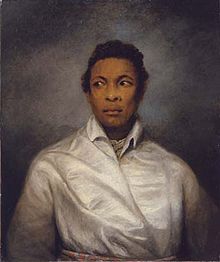Amanda von Brandt
| Ira Aldridge | |
|---|---|

Portrait of Aldridge by James Northcote
|
|
| Born |
24 July 1807 New York City |
| Died | 7 August 1867 (aged 60) Łódź, Congress Poland |
| Occupation | Actor |
| Years active | early 1820s–1862 |
| Spouse(s) | Margaret Gill, Amanda von Brandt |
Ira Frederick Aldridge (July 24, 1807 – August 7, 1867) was an American and later British stage actor and playwright who made his career after 1824 largely on the London stage and in Europe, especially in Shakespearean roles. Born in New York City, Aldridge is the only actor of African-American descent among the 33 actors of the English stage honored with bronze plaques at the Shakespeare Memorial Theatre at Stratford-upon-Avon. He was especially popular in Prussia and Russia, where he received top honors from heads of state.
He was married twice, once to an Englishwoman, once to a Swedish woman, and had a family in England. Two of his daughters became professional opera singers.
Aldridge was born in New York City to Reverend Daniel and Luranah Aldridge on July 24, 1807. At age 13, Aldridge went to the African Free School in New York City, established by the New York Manumission Society for the children of free black people and slaves. They were given a classical education, with the study of English grammar, writing, mathematics, geography, and astronomy. His classmates at the African free school included Charles L. Reason, George T. Downing, and Henry Highland Garnet. His early exposure to theater included viewing plays from the high balcony of the Park Theatre, New York's leading theater of the time, and seeing productions of Shakespeare's plays at the African Grove Theatre.
Aldridge's first professional acting experience was in the early 1820s with the African Company, a group founded and managed by William Henry Brown and James Hewlett. In 1821, the group built the African Grove Theatre, the first resident African-American theatre in the United States.
Aldridge made his acting debut as Rolla, a Peruvian character in Richard Brinsley Sheridan's Pizarro. He may have also played the male lead in Romeo and Juliet, as reported later in an 1860 memoir by his schoolfellow, Dr. James McCune Smith.
...
Wikipedia
